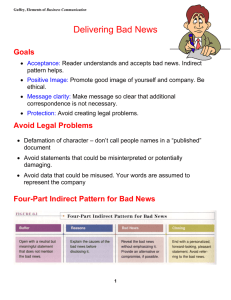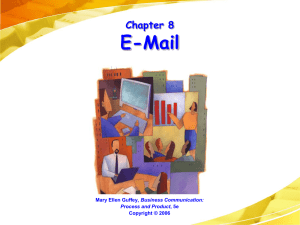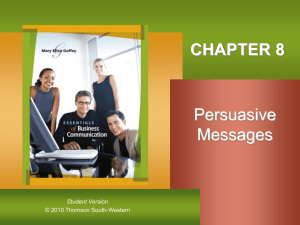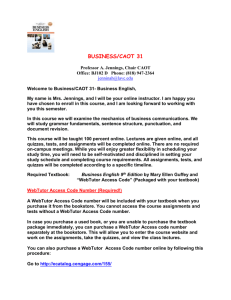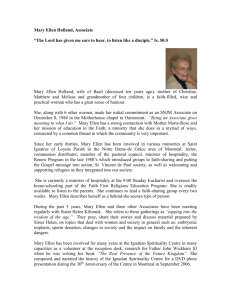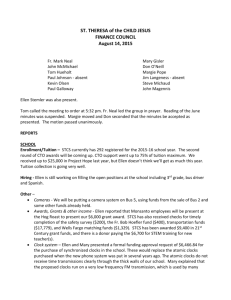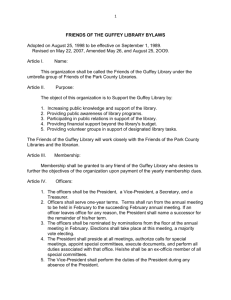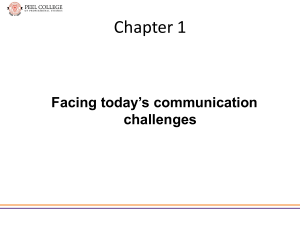Business Communication: Process and Product, 4e
advertisement
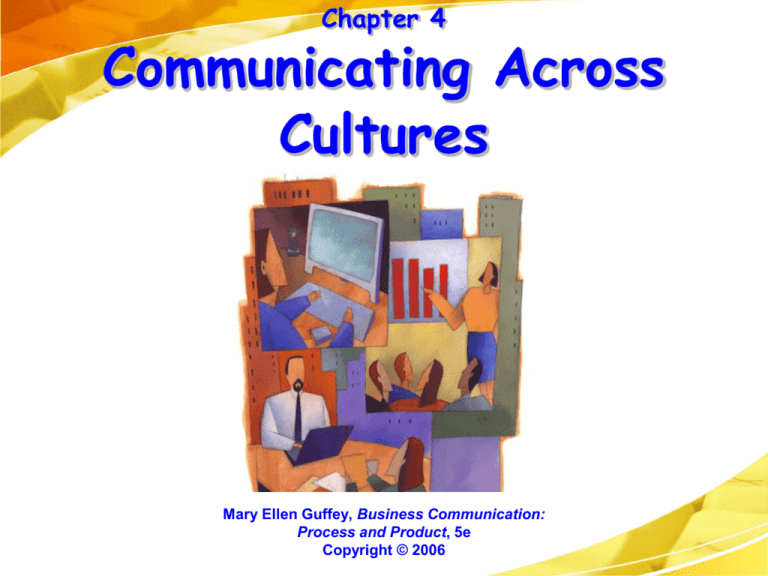
Chapter 4 Communicating Across Cultures Mary Ellen Guffey, Business Communication: Process and Product, 5e Copyright © 2006 Increasing Importance of Intercultural Communication • Technological advancements • General global interconnectivity • Globalization of markets • Intercultural workforce Mary Ellen Guffey, Business Communication: Process and Product, 5e Ch. 4, Slide 2 Understanding Culture How is culture like a computer program? Society, gender, race, age, religion, and other factors control our reactions and behavior. Mary Ellen Guffey, Business Communication: Process and Product, 5e Ch. 4, Slide 3 Characteristics of Culture 1. Culture is learned. 2. Cultures are inherently logical. 3. Culture forms our self-identity and community. 4. Culture combines the visible and the invisible. 5. Culture is dynamic. Mary Ellen Guffey, Business Communication: Process and Product, 5e Ch. 4, Slide 4 Improving Communication With Intercultural Audiences Oral Messages • Learn foreign phrases. • Use simple English. • Speak slowly and enunciate clearly. • Observe eye messages. • Encourage accurate feedback. • Check frequently for comprehension. Mary Ellen Guffey, Business Communication: Process and Product, 5e Ch. 4, Slide 5 Improving Communication With Intercultural Audiences Oral Messages • Accept blame. • Listen without interrupting. • Tell speakers if you don’t understand. • Remember to smile! • Follow up in writing. Mary Ellen Guffey, Business Communication: Process and Product, 5e Ch. 4, Slide 6 Improving Communication With Intercultural Audiences Written Messages • Adapt to local formats. • Use short sentences and short paragraphs. • Avoid ambiguous expressions. • Strive for clarity. • Use correct grammar. Mary Ellen Guffey, Business Communication: Process and Product, 5e Ch. 4, Slide 7 Improving Communication With Intercultural Audiences Written Messages • Cite numbers carefully. • Accommodate reader in organization, tone, and style. Mary Ellen Guffey, Business Communication: Process and Product, 5e Ch. 4, Slide 8 Making Ethical Decisions Across Borders • • • • Broaden your view of other cultures. Avoid reflex judgments. Find alternatives. Refuse business if options violate your basic values. • Conduct all business openly. • Don’t rationalize shady decisions. • Resist lawful but unethical strategies. Mary Ellen Guffey, Business Communication: Process and Product, 5e Ch. 4, Slide 9 Comparing U.S. and Foreign Views How Many U.S. Persons View Themselves Informal, friendly, casual Egalitarian Direct, aggressive Efficient Goal- and achievement-oriented Profit-oriented Resourceful, ingenious Individualistic, progressive Dynamic, identify with work Enthusiastic, prefer hard sell Open How Many Foreigners View U.S. Persons Undisciplined, too personal Insensitive to status Blunt, rude, oppressive Opportunistic, obsessed with time Promise more than they deliver Materialistic Deals more important than people Self-absorbed Driven Deceptive, fearsome Weak, untrustworthy Mary Ellen Guffey, Business Communication: Process and Product, 5e Ch. 4, Slide 10 Diversity Demographics Quiz 9. The most profound challenge for managers and administrators in all organizations striving for diversity will center on _____________? a. recruiting c. management style b. promotion d. communication Mary Ellen Guffey, Business Communication: Process and Product, 5e Ch. 4, Slide 11 Diversity Demographics Quiz 9. The most profound challenge for managers and administrators in all organizations striving for diversity will center on _____________? a. recruiting c. management style b. promotion d. communication Mary Ellen Guffey, Business Communication: Process and Product, 5e Ch. 4, Slide 12 Tips for Capitalizing on Workforce Diversity • • • • Seek training. Understand the value of differences. Don’t expect conformity. Create zero tolerance for bias and stereotypes. • Learn about your cultural self. • Make fewer assumptions. • Build on similarities. Mary Ellen Guffey, Business Communication: Process and Product, 5e Ch. 4, Slide 13 End Mary Ellen Guffey, Business Communication: Process and Product, 5e Ch. 4, Slide 14
